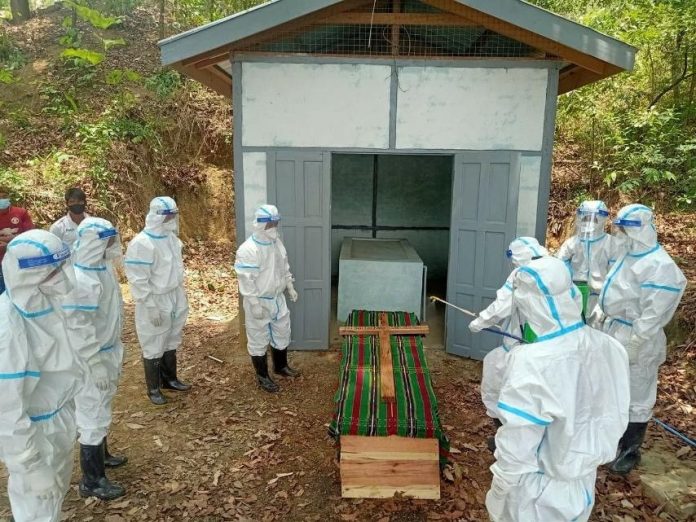Ye Thurein remembers the first time he led a rescue team to break down the doors of an elderly COVID-19 patient’s home in Myanmar’s largest city Yangon after a third wave of the coronavirus began to ravage the country in late May amid a shortage of hospital beds and medical supplies.
“At first, we noticed a strange smell when we got there, but I didn’t know what it was,” the head of Sangyaung township’s Wailuwun (North) Ward Reserve Fire Brigade told RFA’s Myanmar Service.
“When we opened the door, it became stronger. The pungent odor was coming from the bedroom. I remember exactly how I vomited right there. It was an utter nausea I had never felt before.”
Efforts to control the spread of the coronavirus in Myanmar were dealt a serious blow when the military seized power in a Feb. 1 coup d’état. The country’s healthcare system is now at the brink of collapse due to a poorly managed response to a third wave of COVID-19 that has killed more than 8,600 people in the past month alone.
The country’s public hospitals are operating at maximum capacity and have been turning away all but the most seriously ill. Other patients are being forced to settle for treatment at home amid shortages of basic medical necessities, including oxygen supplies critical to mitigating hypoxia, when oxygen fails to reach bodily tissues.
Amid the disorder, Ye Thurein said that his fire brigade is increasingly being called to investigate strange smells and missing person reports, only to find the remains of elderly COVID-19 patients who have died alone in their homes because they lacked access to treatment and caretakers.
He said he had personally handled eight such cases in Sangyaung township from mid-July to mid-August out of around 130, retrieving the bodies of people in their 60s or older for cremation after having to force his way into their homes.
“Some of them have two or three layers of locks inside. There are often wrought iron gates on the outside and then more two or three locks inside, so we have to force them open to get in,” he said. “We have to do it because if we can get there in time, we might be able to administer oxygen to the patient if required … But often we get there too late.”
Ye Thurein said that his team had encountered the remains of several residents who had contracted COVID-19 and were unable to leave their homes or suffered from mental health issues. In some cases, the deceased were found in a sitting position and already in an advanced state of decomposition.
Reaching out to neighbors
A resident of the township named Tun Zaw Oo told RFA that he recently noticed that a neighbor who was living alone had gone missing and called for assistance because of a putrid smell in the area.
“I didn’t know where the smell came from and so I went out looking for it. There was only one person living there, but the door was closed, and no one came out. The next day, the smell got stronger. I didn’t see anyone going or coming from that apartment, so I informed a rescue team that something was wrong,” he said.
“There were three doors. The first was an iron grille. The second was a glass door. And then his bedroom door. The rescue team had to force all of these open. When they entered, he was found dead in his bedroom.”
Tun Zaw Oo urged elderly neighbors to reach out to their neighbors if they require assistance.
“People living in flats who are not well and need help should let their neighbors know,” he said.
“In fact, in this time of the pandemic, they should regularly talk about their situation to neighbors—especially when they live alone. If they do so, people can help them get food or necessary medicines. It’s better to say something.”
The official number of infections rose Wednesday to a total of 360,291 since Myanmar’s first recorded case in March last year, with at least 13,623 dead, although the actual numbers are believed to be substantially higher, based on reports by aid groups.
Copyright © 1998-2020, RFA. Used with the permission of Radio Free Asia, 2025 M St. NW, Suite 300, Washington DC 20036. For any commercial use of RFA content please send an email to: [email protected]









